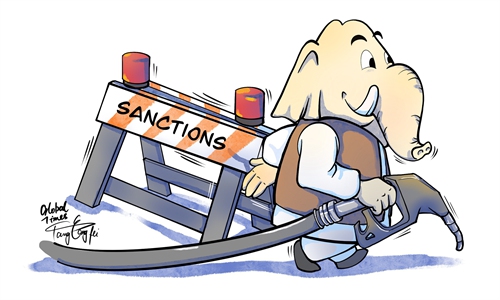
Illustration: Chen Xia/GT
The news that India may accept a Russian offer to buy crude oil and other commodities at discounted prices with payment via a rupee-rouble transaction has obviously irritated some US and European "experts" who condemned the move. The US government should sanction India, according to Fox Business Network anchor Trish Regan in a tweet on Tuesday, warning that US sanctions would devastate the Indian economy. On Wednesday, CNBC quoted White House press secretary Jen Psaki as warning India "think about where you want to stand when history books are written at this moment in time."
The American elites are not yet used to the world turning against the US, but they will become more accustomed. It wants global support to sanction and suppress Russia, but each country has its own history and situation, as well as a different historical entanglement with the US and Russia. Regan tweeted: "You are with us or you are against us." These words were famously spoken by George W. Bush before the US launched its "war on terror" in 2001. Does Regan believe the US retains the kind of mobilization power it had 20 years ago? Since then, US influence to rally and mobilize other nations has greatly waned. Only its little brothers would still listen to its command.
Americans like Regan probably forget that unlike Japan and Australia, which are formal treaty allies of the US, India is just a strategic partner with no treaty obligations or security commitments in ties with the US. This means that India has more capabilities to ignore the will of the US. At least when it comes to national sovereignty, India has more capabilities and will to determine its own national destiny than those pawns of the US.
India has gone through a lot of frictions and distrust between itself and the US over the years. It was subjected to sanctions since its nuclear tests in 1998, leading India to be wary of the US. Despite being seemingly congenial, when it comes to critical issues, the US does not have much influence on India.
India has advocated a balanced diplomatic strategy and followed a course of multi-alignment so that it can gain benefits from relations with all major powers.
India's relationship with Russia is far better than its relationship with the US. India never wanted the US to take over Russia's place in its foreign policy. Russia is one of the largest providers of arms, including advanced weapons. This has strong security, political and diplomatic connotations. As oil prices soar and India faces economic pressure due to the COVID-19 epidemic, it should take advantage of the opportunity to obtain discounted resources.
Under globalization, the US can make its sanctions lethal only by uniting all other countries - its unilateral sanctions are useless as India can find a plan B. It's not easy for the US to crush the world's sixth-largest economy in a country of 1.38 billion people.
The US wants to divide the world into two camps again, but its allies are not in line with the US, not to mention other strategic partners like India, or even the majority of developing countries. Although more than 140 countries signed the UN resolution to condemn Russia, only dozens followed the US, imposing sanctions. In other words, they may say what the US wants to hear, but won't necessarily do what Washington prefers.
The US imports approximately 96 percent of the country's potassium fertilizer from Russia, and relies on Russia and its allies Kazakhstan and Uzbekistan for roughly half of the uranium powering its nuclear plants. Neither the potassium fertilizer nor the uranium is on the sanction list. In addition, its "ban" on Russia's crude oil and gas accounts for only 8 percent of its imports.
Sanctions backfire in today's world. The more the US imposes sanctions on other countries, the more they will weaken the US itself.
Even the US won't completely sanction Russia as it would be putting its own economy at risk. India and US allies in NATO will consider their own interests in terms of energy and economics.
The article was compiled by Global Times reporter based on an interview with Qing Yun, an expert on China-US relations based in Shanghai. opinion@globaltimes.com.cn


